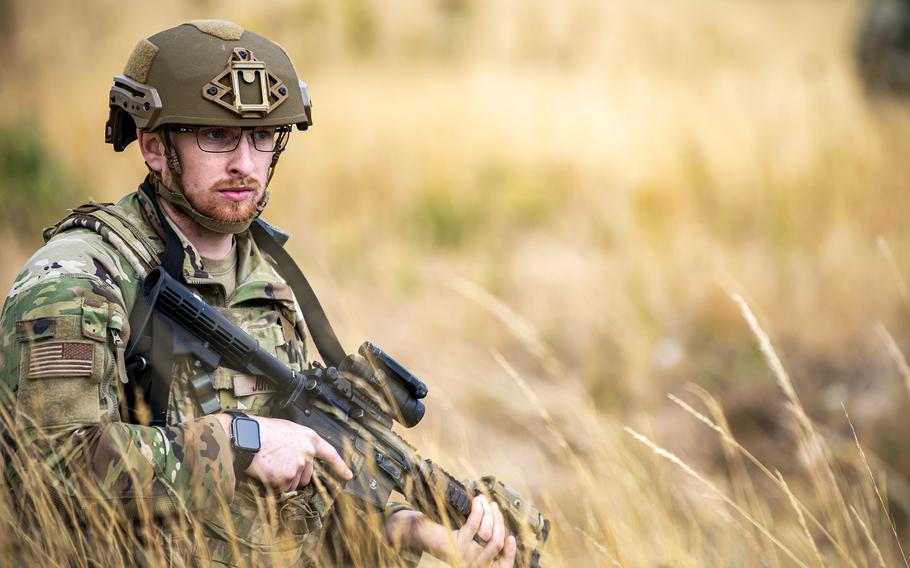
Airman 1st Class Isaac John holds his position during a field training exercise at Stanford Training Area, England, Aug. 17, 2022. The House Armed Services Committee approved an amendment that would mandate a three-year Air Force test program to study the effects of beard-wearing in the service. (Eugene Oliver/U.S. Air Force)
Lawmakers took steps this week toward making beards acceptable in the military, with the House Armed Services Committee approving a proposal directing the Air Force to run a selective three-year pilot program that could lead to permanent approval.
An amendment in the draft 2025 National Defense Authorization Act that was adopted unanimously by the committee Wednesday would require the Air Force to study the impact of allowing Air Force and Space Force members in certain units to grow beards.
Selection of the units for the pilot program would be up to the Air Force secretary, who is directed in the legislation to ensure that the units picked are “located in geographically diverse areas” and “perform various missions.”
The service would be required to submit an initial report to Congress within a year of the start of the program, followed by a final report at the end with the Air Force secretary’s recommendation on whether to make the program permanent.
The reports would evaluate whether beards affect the airtight seals of gas masks or similar equipment and whether beards improve inclusivity for those with shaving waivers based on skin conditions or religious beliefs.
In addition, the reports would examine the impact that beards have on discipline, morale and unity, as well as identify any negative perceptions or biases toward members with beards.
The amendment was introduced by Rep. Marc Veasey, D-Texas.
Next month, the Senate Armed Services Committee will discuss its version of the defense legislation. Both chambers will then come together to negotiate the final bill, which typically passes Congress by the end of the year.
If the NDAA that becomes law ends up preserving Veasey’s provision, airmen could see the pilot program established as early as six months afterward.
The House panel also approved another Veasey amendment requiring the Navy to brief committee members on a 2023 study by the Naval Health Research Center on the effect of beards on gas mask seals, with the briefing due by March 1.
The proposal acknowledged that the Navy study had “raised questions about the balance between uniform and grooming standards, and the impact on military readiness and recruiting.”
The amendments are likely to be welcomed by airmen who have long advocated for the ability to grow beards without a waiver.
Currently, airmen are not required to shave only if they have a religious exemption or a medical waiver for conditions such as pseudofolliculitis barbae, which causes painful razor bumps and disproportionately affects Black men.
The number of shaving waivers for medical conditions granted to airmen and guardians has nearly doubled over the past three years, according to reporting by Military.com.
A study published last year in Military Medicine found that shaving waivers in the Air Force are associated with longer times to promotion, disproportionately affecting Black service members.
In the study, 64% of those on shaving waivers were African American despite only about 13% of the survey cohort being Black.
All military services have faced growing legal and internal pressure to relax grooming standards, as debates on social media and in various other forums highlight the struggle to balance tradition and uniformity with individual rights.